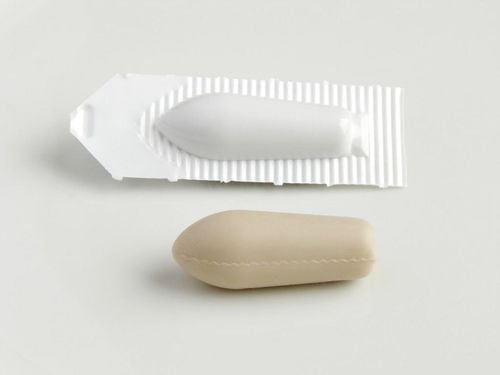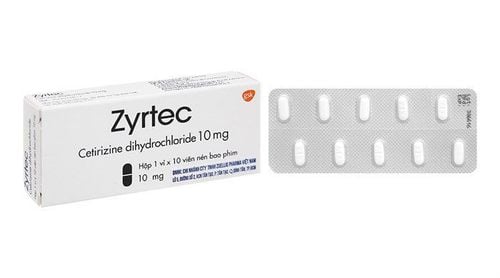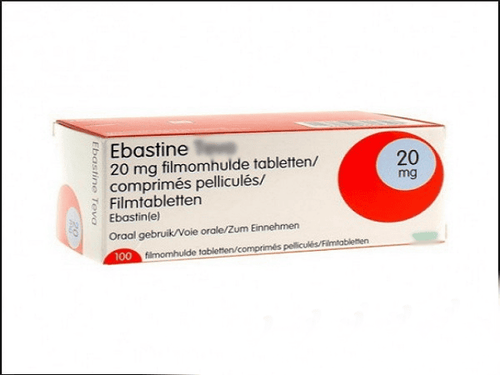Allergic rhinitis or chronic idiopathic urticaria causes uncomfortable symptoms for patients. To improve these symptoms, patients need to use H1 antihistamines such as Acrivastine in Allergex 8mg product.
1. What is Allergex 8mg?
Allergex 8mg is a product of OPV Pharmaceutical Joint Stock Company with the main active ingredient being Acrivastine at a concentration of 8mg. Allergex is used to help reduce symptoms caused by seasonal allergic rhinitis, chronic idiopathic urticaria, cholinergic urticaria, or cold-induced urticaria. Allergex 8mg is available in hard capsule form.
2. What is Allergex 8mg used for?
Allergex 8mg is indicated for the following cases:
- Treating symptoms of seasonal allergic rhinitis such as runny nose, itchy nose, sneezing, itchy or red throat, itchy eyes, and watery eyes.
- Treating chronic idiopathic urticaria, cholinergic urticaria, or cold-induced urticaria.
Pharmacologically, Acrivastine in Allergex is a histamine antagonist structurally related to triprolidine and does not cause sedation. Additionally, Acrivastine does not have significant antimuscarinic or sedative effects.
Acrivastine is well absorbed orally, reaching peak plasma concentrations about 1.5 hours after taking Allergex 8mg. The half-life of Acrivastine is about 1.5 hours, and it is primarily excreted through urine.
3. How to use Allergex 8mg
Usage: Patients should swallow Allergex 8mg capsules whole with a glass of water, which can be taken before or after meals.
Dosage:
- The recommended dosage for adults and children over 12 years old is 1 capsule (8mg) per dose, 3 times a day.
- The recommended dosage is for reference only and may vary depending on the patient's condition and specific doctor's prescription.
Overdose and treatment:
- There is no experience with Acrivastine overdose.
- If necessary, symptomatic and supportive treatment can be provided, including inducing vomiting if the patient is conscious.
- In some cases, gastric lavage may be performed, but caution is needed regarding the risk of aspiration pneumonia, especially in children.
- Patients using Allergex 8mg should not self-medicate beyond the recommended dosage, as taking more medication does not improve symptoms faster but increases the risk of toxicity or serious side effects.
- Do not share your Allergex 8mg medication with others, even if they have similar symptoms, as there is a risk of exceeding the prescribed dosage.
4. Side effects of Allergex 8mg
During the use of Allergex 8mg, some unwanted side effects (ADRs) may occur, although they are relatively rare, such as:
- Drowsiness
- Fatigue
- Dizziness
- Loss of coordination
- Headache
- Psychomotor disorders
- Skin rash
- Hypersensitivity reactions
- Blood disorders
- Seizures
- Sweating
- Muscle pain
- Extrapyramidal reactions, tremors
- Confusion
- Tinnitus
- Hypotension
- Hair loss
- Palpitations, arrhythmias
If side effects occur, patients should immediately stop using the medication and quickly inform their doctor or go to the nearest medical facility for timely treatment.
5. Some precautions when using Allergex 8mg
Before using any medication, including Allergex 8mg, patients should carefully read the instructions or consult a doctor or pharmacist.
Contraindications of Allergex 8mg:
- Hypersensitivity to Acrivastine or any other components in Allergex.
- Allergy to Triprolidine.
- Severe renal impairment.
- Children under 12 years old.
Caution when using Allergex 8mg in patients with the following conditions:
- Porphyrin metabolism disorders.
- Closed-angle glaucoma.
- Urinary retention.
- Prostatic hypertrophy.
- Pyloroduodenal obstruction.
- Epilepsy.
- Liver impairment.
- Elderly patients.
Effects on driving and operating machinery: Allergex 8mg almost does not affect the ability to drive and operate machinery. However, there are rare reports of drowsiness, so depending on the specific case, the doctor may advise whether the patient should use Allergex 8mg while driving or operating machinery.
Pregnancy: The safety and efficacy of using Allergex 8mg during pregnancy have not been proven, so it should only be used when absolutely necessary and after consulting a doctor.
Breastfeeding: The safety and efficacy of using Allergex 8mg during breastfeeding have not been proven and should only be used when the therapeutic benefits outweigh the risks to the nursing infant.
6. Drug interactions of Allergex 8mg
- Do not use Acrivastine concurrently with alcoholic beverages or central nervous system depressants.
- Do not use Terfenadine and Allergex 8mg concurrently.
- Allergex 8mg should not be combined with drugs that inhibit the metabolism of Acrivastine in the liver due to the risk of severe arrhythmias. Substances that can inhibit Acrivastine metabolism include antifungal Ketoconazole and antibiotic Erythromycin.
Allergex 8mg contains the active ingredient Acrivastine at a concentration of 8mg. Allergex is used to help reduce symptoms caused by seasonal allergic rhinitis, chronic idiopathic urticaria, cholinergic urticaria, or cold-induced urticaria. To ensure effective treatment and avoid side effects, patients should use the medication as prescribed or consult a doctor or specialist pharmacist.
To arrange an appointment, please call … or make your reservation directly HERE. You may also download the MyVinmec app to schedule appointments faster and manage your reservations more conveniently.













